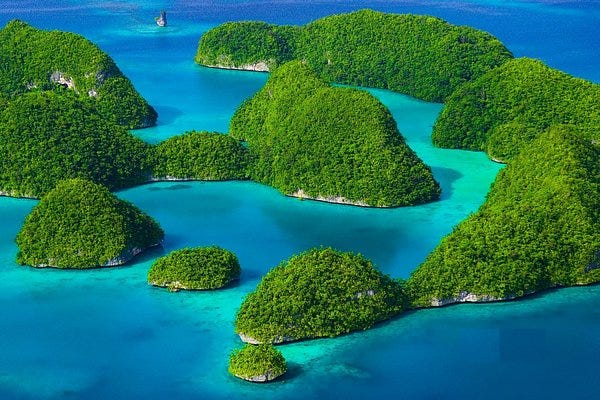Colin Nagy | July 31, 2025
The Palau Says No Edition
On diplomacy, islands, and power politics
Colin here. We're fans of Palau around here at WITI, and have written about it a few times, most recently in the Biosecurity Edition.
The Pacific island nation of just 17,000 people did something rare this week: it said no to the United States. The country's Congress and Council of Chiefs rejected a Trump administration proposal to house asylum seekers who had been denied refugee status in the U.S., part of Washington's push to establish "safe third countries" for deportations.
Why is this interesting?
Because one of America's most loyal allies just turned down a request that looked routine on paper, but exposed raw tensions between sovereignty and dependency.
To Washington, this was an aggro diplomatic ask (not surprising!) But for Palau, it was existential and also sets the stage for more interesting political tension for other countries on the front lines of climate change and sustainability.
Despite its size, Palau sits at the center of Pacific power politics, sitting on the strategic doorstep to China. America is carving out new airstrips not far from WW2 Pacific battles and wants to make it easier for warships to refuel in the port at Koror. The country has a Compact of Free Association deal that grants America strategic military access in exchange for economic aid and immigration privileges. Palauans can live and work in America visa-free. The deal promises nearly $900 million over the next two decades.
So when Palau tells its primary benefactor and security guarantor "we cannot accept this specific proposal" (as the congressional letter said) it is not diplomatic small talk. That's a microstate with very finite resources drawing a line in the sand.
The official reasoning was practical: concerns about legal infrastructure, cultural cohesion, limited capacity. But if you read between the lines, the U.S. actually offered Palau the right to accept or decline each individual case, meaning they could have cherry-picked.
Their blanket rejection suggests deeper concerns. If they say yes this time, what gets asked next? And in a region where China is actively courting influence, does accepting American overflow create precedent to be exploited later?
Here's the thing: Palau's maritime domain is larger than France, and they're already stretched thin dealing with illegal fishing (turns out sea cucumbers are in high demand!), by aggressive Chinese vessels. The U.S. Coast Guard helps with joint patrols, but that cooperation runs mostly on goodwill. Turn the relationship into something super transactional, and the partnership weakens.
This story alludes to something deeper. It's about what happens when frontline states, places literally on the edge of climate change and geopolitical pressure, get asked to solve problems that wealthier nations won't handle themselves.
Without U.S. funding, many of the conservation initiatives Palau is known for, and the biosecurity initiatives we previously covered, could be in trouble.
The timing makes this even more pointed. Palau's president was just in Washington for annual funding talks, meaning lawmakers back home just publicly undercut him while he's asking for money. You gotta love the backbone. (CJN)
